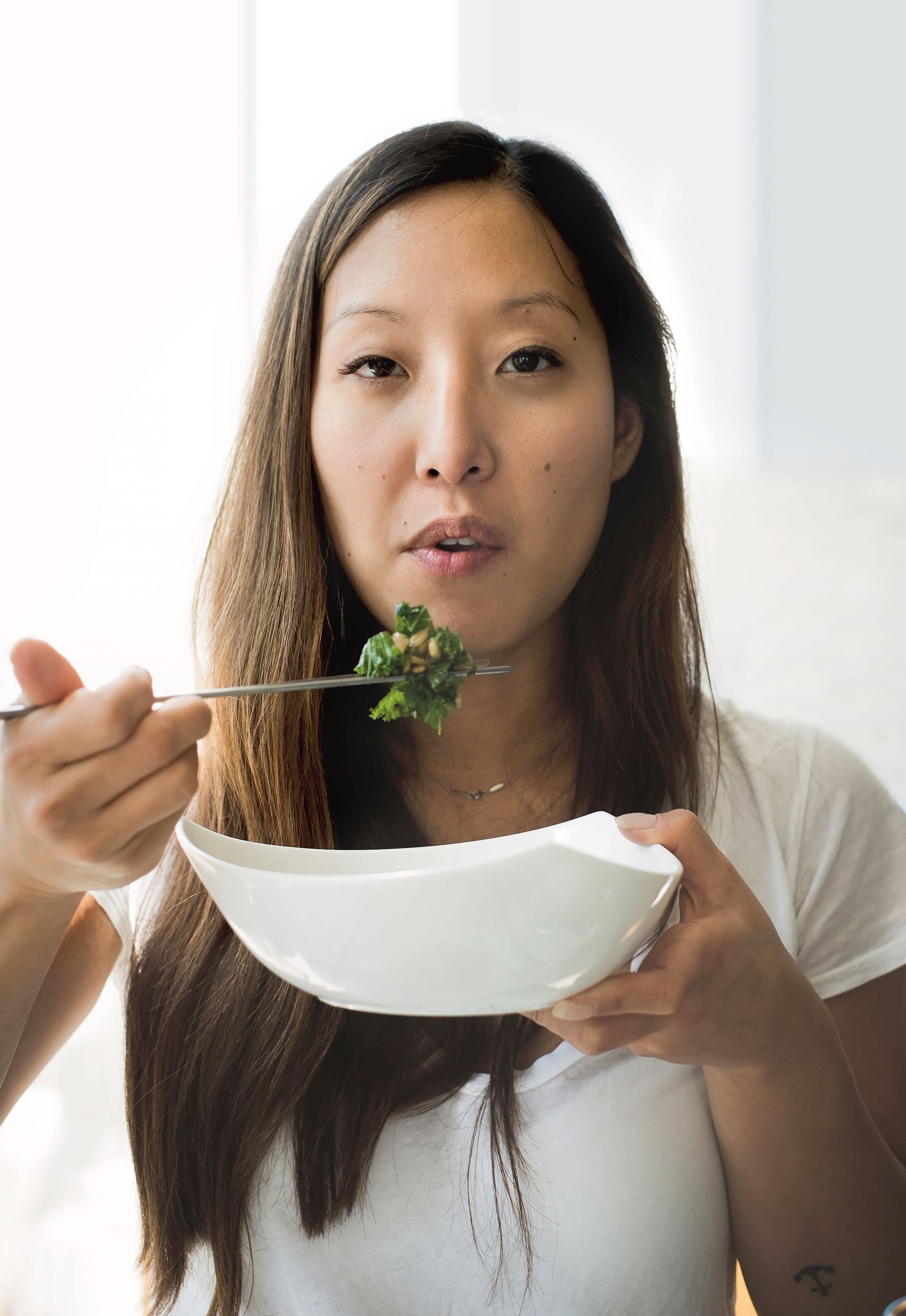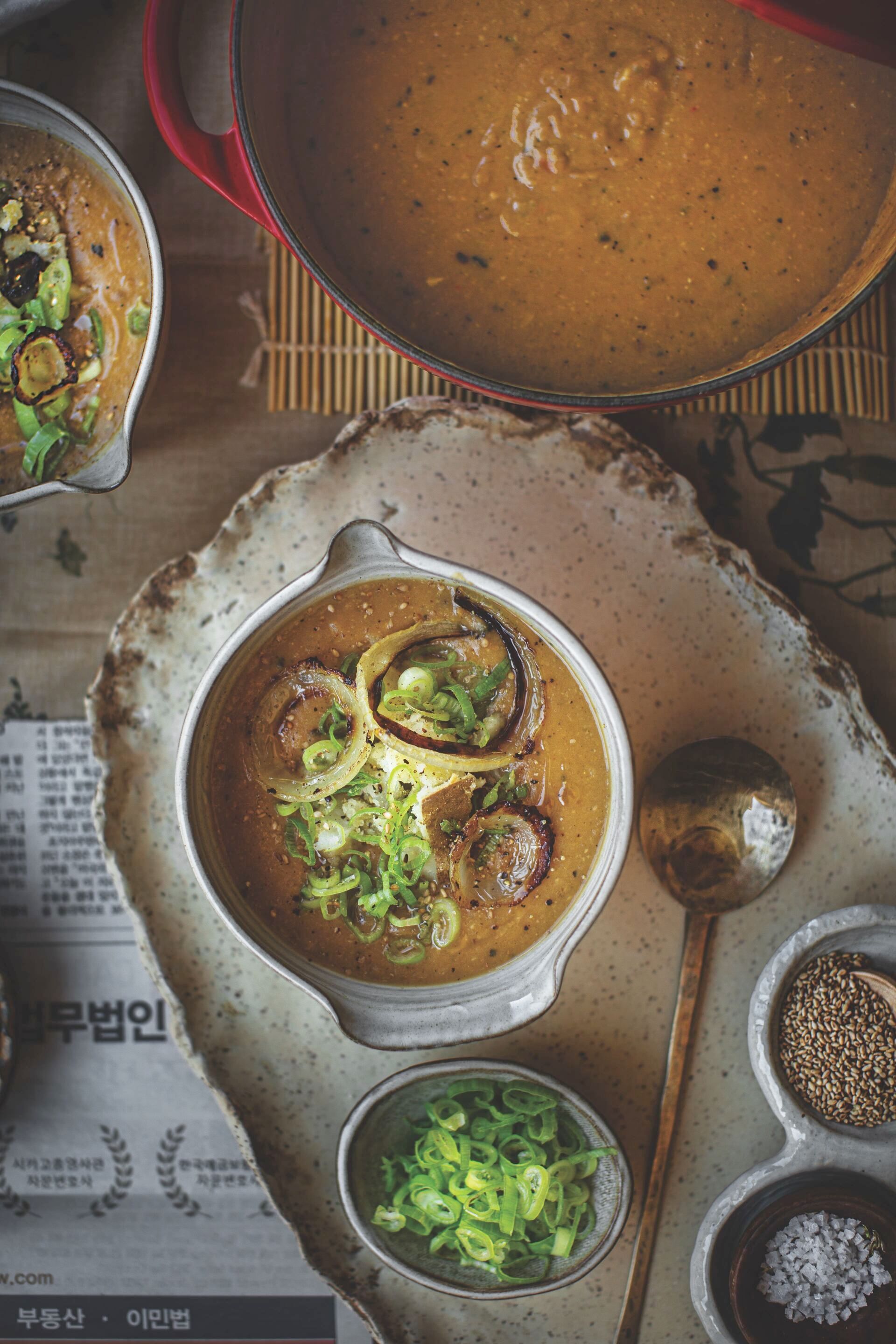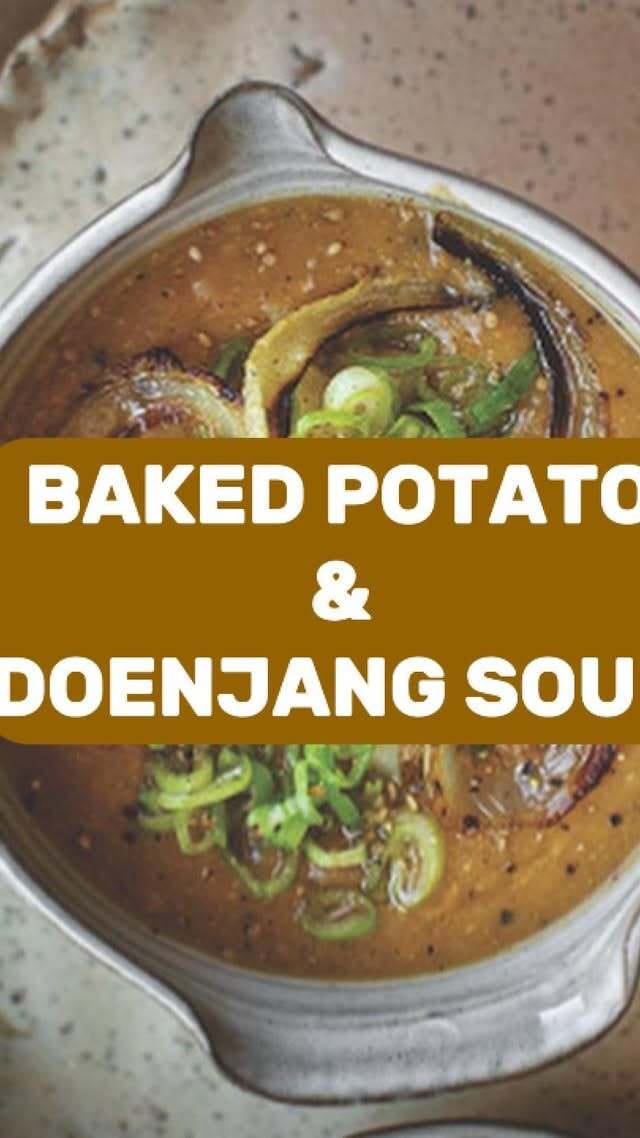- Eat at Joe's
- Posts
- Eat at Joe's: Tasting Korea
Eat at Joe's: Tasting Korea
A report from a trip to Seoul and Sokcho, a conversation with Joanne Lee Molinaro, aka The Korean Vegan, and a recipe for her Baked Potato and Doenjang Soup. Plus: announcing my first Zoom cooking class!
Seoul food
The hot pot told me everything I needed to know.
We were in a restaurant in Yangyang, a mountain town in Gangwon province a couple of hours from Seoul that is famous for its mushrooms, particularly the prized pine mushrooms — songyi in Korean, also known to us shroom-heads as matsutake. It happens to be one of my favorite varieties, right up there with chicken (not hen!) of the woods, and at this restaurant we were served a bubbling bowl of broth with the most beautiful selection of not only those but enoki, wood ear, and cauliflower mushrooms.
The latter had been a revelation on this trip, too, for their lacy, spongy, almost crunchy texture, but my focus was on those matsutakes, especially since we had just come from watching inspectors grade them at an auction house. (A single top-grade mushroom there weighed almost 6 ounces and was expected to fetch the equivalent of $75 to $100!)
In this week's newsletter
I was flexing a bit on the trip, stepping outside my plant-based dietary boundaries so I could learn as much about Korean cuisine as possible in a week. We ate plenty of vegan dishes, but at the center of this table was that hot pot, which also held noodles and a modest amount of shaved beef. I didn’t eat the beef pieces, but I ate everything else and sipped the broth.
Wait, was this a beef broth? My companions (Nadia Cho and Matt Rodbard) and I were tasting and theorizing. I voted no; all I detected in that liquid base were mushrooms. Sure enough, our server told us, it was a mushroom broth.
That’s the moment when all my pride in the power of plants was reinforced, because I realized: The mushrooms didn’t need the beef, by any means. The beef needed the mushrooms.
It was perhaps my favorite moment on a trip full of contenders. We were in the country at the invitation of the city of Sokcho, which is trying to entice more American visitors to tack on an excursion to the north when they visit the incredible metropolis of Seoul.
Trust me, it’s worth it — not just for the beaches and mountains, but for the food in the surrounding region, including Yangyang. For plant-based eaters, the mushrooms alone should be enticement enough.
If you want to learn more about the auction and the importance of the pine mushrooms to Korean cooking, watch this video that my friend and our guide, Nadia, produced for Eater with a forager a few years ago.

Matsutake (aka pine, aka songyi) mushrooms in a hot pot at a restaurant in Yangyang, South Korea.
Nadia and Matt were the perfect travel companions, because Nadia is arguably the best-connected, most knowledgeable guide to Korean food in the United States (besides helping write the recent award-winning book “Jang,” she has guided the likes of Eric Ripert and Anthony Bourdain there, and produced the “Jeong Kwan” episode of “A Chef’s Table”), and Matt (who cowrote the acclaimed cookbooks “Koreatown” and “Koreaworld” with chef Deuki Hong) has traveled there more than a half-dozen times.
I know why Matt has traveled there so often. In a week, I feel like I barely scratched the surface. But what a surface!
Seeking impartial news? Meet 1440.
Every day, 3.5 million readers turn to 1440 for their factual news. We sift through 100+ sources to bring you a complete summary of politics, global events, business, and culture, all in a brief 5-minute email. Enjoy an impartial news experience.
Come to my first Zoom cooking class!
At noon on Sunday, Nov. 16, I'll be showing you how to make three great plant-based recipes for your Thanksgiving feast, and will answer any and all questions! It should be fun!
On the menu: Caramelized Onion Dip, Whole Roasted Cauliflower with Romesco, and Chocolate Cinnamon Tart. Sound good? Reserve your spot here!
AND, readers of this newsletter can enjoy 25% off a ticket! Just use the code “eatatjoes” at checkout!
I break for animals:
Mela
Recipe: Baked Potato and Doenjang Soup
Doenjang, the Korean fermented soybean paste, gives this velvety soup umami and depth. If you’ve never used it, now’s your chance!
|
4 servings // Time: Weekday // Storage: Refrigerate for up to 5 days, or freeze for up to 3 months.
Ingredients
1 head garlic
Extra-virgin olive oil, for drizzling
3 medium russet potatoes
1 medium yellow onion, cut into ½-inch-thick rings
1 teaspoon fine sea salt, plus more to taste
2 teaspoons cracked black pepper
1½ tablespoons doenjang (Korean fermented soybean paste)
1 cup vegetable broth
1½ cups unsweetened plant-based milk
½ cup water
1 scallion, trimmed and thinly sliced
1 tablespoon toasted sesame seeds
1 teaspoon toasted sesame oil
2 tablespoons chili oil (optional)
Directions
Preheat the oven to 450°F. Slice off the top of the head of garlic. Drizzle a little olive oil over the cut side, then wrap the head tightly in foil. Pierce the potatoes with a fork and bake with the garlic until the potatoes are fork-tender and the garlic cloves are caramel colored and soft, 50 to 60 minutes.
While the garlic and potatoes roast, coat the onion slices with olive oil, ½ teaspoon of the salt, and 1 teaspoon of the pepper. Spread the onion slices on a baking sheet and roast until they start to brown, 18 to 20 minutes. Set aside.
Squeeze the roasted garlic into a high-powered blender. Scoop the flesh of 2 of the baked potatoes into the blender along with the doenjang, vegetable broth, plant-based milk, water, the remaining ½ teaspoon salt, and remaining 1 teaspoon pepper until smooth. Taste and season with more salt as needed. If the soup cools during blending, reheat in a saucepan before serving.
Garnish with the roasted onion slices, chunks of the remaining baked potato, scallion, sesame seeds, sesame oil, and chili oil. Enjoy immediately or store in the refrigerator for up to 3 days.
Substitutions
Russet potatoes: Yukon gold potatoes
Yellow onion: White or red onion.
Doenjang: Red miso (if you must).
Vegetable broth: Water.
Plant-based milk: Dairy milk.
Scallion: Chives or parsley.
Sesame seeds: Pumpkin seeds or sunflower seeds.
Toasted sesame oil: Smoked olive oil.
Chili oil: Pinch crushed red pepper flakes.
Recipe adapted slightly from “The Korean Vegan Homemade” (Avery, 2025), copyright Joanne Lee Molinaro.
Q&A: Joanne Lee Molinaro on “The Korean Vegan Homemade”
Ironically, while I was getting the education of a lifetime on my trip, I had to give up a chance to interview — and hang out with — one of the best-known Korean-Americans in the food world. Joanne Lee Molinaro, aka The Korean Vegan, was visiting D.C. on tour for her second book, “The Korean Vegan Homemade.” When I told Joanne I’d have to miss her, she was gracious and thrilled about my trip — and pointed me to what became my favorite among so many great bakeries: Leedorim in Seoul, where I tasted the best vegan pastries ever.
As soon as I returned, I was itching to get in the kitchen to make something with the products I brought back from Seoul, including a wonderful doenjang, the fermented soybean paste that forms the umami backbone of so many Korean dishes. It was no surprise, since I had already worked with her on wonderful recipes for “Mastering the Art of Plant-Based Cooking,” but Joanne’s new book provided just what I was craving, the deliciously deep-flavored soup made from baked potatoes pureed with roasted garlic, doenjang, vegetable broth and soy milk whose recipe is above.

(Geoff Martin Photography)
The same day I made — and devoured — it, I got on a Zoom call with Joanne so we could discuss her book and its recipes, Korean ingredients, and the state of the world. Here is an edited excerpt from our conversation:
Joe: What was your motivation for the second book? How did you want it to feel different from your first one?
Joanne: I’m still sharing the very traditional Korean dishes but also more Korean American dishes like the kimchi mac and cheese or even the baked potato soup, because I love potatoes. This is very Joanne.
I don't know if you saw the K-drama “Bon Appetit, Your Majesty.”
Joe: No, I didn’t.
Joanne: It was really popular. And every single week it was a spin on a traditional Korean dish. And so I think that there's definitely an awareness of K-food, K-flavors. I also wanted to show people how to incorporate Korean ingredients into whatever they're making. I make pasta, I make soup, I make nachos, I make quesadillas. And I incorporate kimchi, gochujang, doenjang into those things. But whatever you're making, you should feel confident to experiment with those things, too.
Joe: Americans have fallen in love with Korean barbecue and fried chicken and bo ssam and kimchi and gochujang, and now kimbap. Ram-don had its breakout from the movie “Parasie.” What do you think will be the next breakout ingredients from Korea for Americans?
Joanne: I really think doenjang is going to be the next one. It was so surprising to me when doenjang jjigae was such a popular recipe from my first book. It speaks to the American palate's readiness for that complex flavor. It's so easy to use. Yes. And it's so good for you. It's such a great way to flavor things with, especially people who are trying to use less salt.
Joe: I brought this exquisite jar of it back that I was so excited to use in that potato soup. I read people describe it a lot as Korean miso. But that sells it short, it seems to me.
Joanne: I understand trying to translate it for people who don't have the vocabulary. But it's fermented in a very different way. It's used for different things. They're very, very different, and you can taste it pretty immediately. There's also just the history of the two countries, their relationship over the past century, and why Korean people feel the need to constantly differentiate themselves from Japan and its culture.
Joe: Given how much you’ve shown the power of storytelling to make change, I’m wondering if you have any thoughts about the role of cooking in activism and resistance, especially given what’s happening here in the U.S. under the Trump administration.
Joanne: I wish I had better answers. There's a part of me that wants to say every human at this point needs to be participating in and potentially saving our democracy, because I really believe that we're at a point where if we don't do something, we will lose the soul of this country, we will have passed the point of no return.
I've always shared stories because I think food is a great vehicle for disarming people. When you invite someone over for dinner, it’s very hard for them to be stubborn and uncompromising in their position when they're being offered food, right?
Joe: The other thing on my mind recently is the crisis involving the government shutdown, food stamps, and food assistance. Are there lessons in Korean cooking for people trying to make ends meat?
Joanne: There's nothing like food insecurity. It is the worst thing a human being can feel. So it's hard for me to try and talk about it in a way that's as inclusive as possible to every imaginable emotion associated with something that's so diabolical to humanity.
In terms of Korean food, you're 100 percent right. I was just talking about kimchi yesterday at the event that I was doing in Boulder. Somebody asked me, what was kimchi like 100 years ago? And I was like, oh, I love this question. And I was like, it was saltwater and cabbage. It wasn't red. It wasn't spicy. There was no fish sauce. There was no shrimp paste. It was just saltwater and cabbage.
You have to understand something about Korea's history. Its geopolitics has always been that it is literally on the brink of ruination, and there was always huge huge food insecurity. That is the spine of their existence. That's why you have foods like kimchi. How am I going to make this cabbage last for longer than a week?
But what do you tell people who've been on food stamps and government aid for so long and they're having it stripped away? I just don't know. I think that sometimes I worry that my romanticized version of Korea's history and resilience might be a little tone deaf.
People don't need a nice story right now. They need donations. They need food. They need cash. They need hard solutions.
More favorite Korean-style recipes
These are gift links to the recipes at the Post. Note that they require you to register but not subscribe. Gift links are free to access for 2 weeks, so if you want to come back to any of these recipes but don’t subscribe or want to subscribe, I suggest you find a way to save them!
That’s it for this week’s newsletter. Do you have friends you think might want to Eat at Joe’s? Invite them today and don’t forget those gifts you can earn through referrals — see above!
If you were forwarded this email, welcome! And know that you can get your very own copy in your very own in-box of your very own phone or laptop on your very own Sundays by clicking below.
Until next week,









Reply